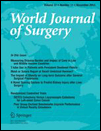Prognostic Nutritional Index Predicts Postoperative Outcome in Colorectal Cancer
Abstract
Background
The prognostic nutritional index (PNI), which is calculated based on the serum albumin concentration and peripheral blood lymphocyte count, is a useful tool for predicting short-term and long-term postoperative outcome in patients undergoing cancer surgery. However, few studies have investigated PNI in colorectal cancer surgery. We examined the ability of PNI to predict short- and long-term outcomes in patients with colorectal cancer.
Methods
This retrospective study included 365 patients who underwent resection for colorectal cancer. The prognostic nutritional status was calculated on the basis of admission data as follows: 10 × serum albumin (g/dl) + 0.005 × total lymphocyte count (per mm3). The primary outcomes measured were the impact of PNI on overall survival and postoperative complications.
Results
Kaplan–Meier analysis and the log rank test revealed that low PNI was significantly associated with poor survival (P < 0.0001). In multivariate analysis for survival, preoperative low PNI was an independent prognostic factor for poor survival: odds ratio: 2.25, 95 % confidence interval 1.42–3.59). Moreover, low PNI significantly correlated with the incidence of postoperative complications, especially serious ones.
Conclusions
Preoperative PNI is a useful predictor of postoperative complications and survival in patients with colorectal cancer.




